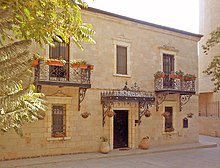| This article contains promotional content. Please help improve it by removing promotional language and inappropriate external links, and by adding encyclopedic text written from a neutral point of view. (February 2022) (Learn how and when to remove this message) |

Maskit (Hebrew: משכית) is an Israeli fashion house founded in 1954 by Ruth Dayan, the first wife of Moshe Dayan. It was the first fashion house in Israel. Maskit produces textiles, clothing, objets d’art, and jewelry.
Etymology

The Hebrew word "maskit," meaning an ornament, or something small and beautiful, appears in the Bible 14 times.
History

During the early years of the state of Israel, Ruth Dayan recognized the artistic skills of many new immigrants, particularly in decorative arts like embroidery and crafts. In 1954, she established Maskit with the aim of blending modern European patterns with ethnic embroidery traditions.
In 1955, Dayan met fashion designer Finy Leitersdorf, who designed clothes and accessories for Maskit over a period of 15 years. The two collaborated on a joint exhibit of Maskit designs at the Dizengoff Museum (today the Tel Aviv Museum).
In an interview in 1966, Leitersdorf spoke about the "Israeliness" of Maskit clothing. It was not just the Yemenite embroidery, she said, but the "range of colors - the desert brown, the impure black inspired by Bedouin tents, and the eternally changing blue of the Mediterranean." She also cited the loose design, appropriate for the country's hot climate.
Clients such as Audrey Hepburn attest to the worldwide success of Maskit in the 1960's. From the 1960s to the 1980s, Maskit employed 2,000 people, with ten stores in Israel and one in New York. Maskit garments were sold by Bergdorf Goodman, Neiman Marcus and Saks Fifth Avenue.
The company closed in 1994 but it was reopened in 2013 by Nir and Sharon Tal, who had worked for Deloitte and Alexander McQueen. One of the investors was Israeli businessman Stef Wertheimer, founder of the industrial tool manufacturer Iscar.
See also
- Israeli fashion
- Economy of Israel
- Culture of Israel
- American–German Colony, where Ruth Dayan opened a Maskit branch and the "Keren" restaurant, a pioneer of Israeli fine dining
References
- How an Israeli luxury fashion brand transitions to modified heritage, Forbes
- Maskit: The revamping of Israel's first ever fashion house
- Breathing new life into legendary Israeli fashion brand Maskit, Haaretz
- A Leitersdorf showcase, Haaretz
- McQueen to Maskit: The mind behind the brand
- Friedman, Vanessa (15 July 2014). "Fashion During Wartime". NYTimes. Archived from the original on 19 July 2014.